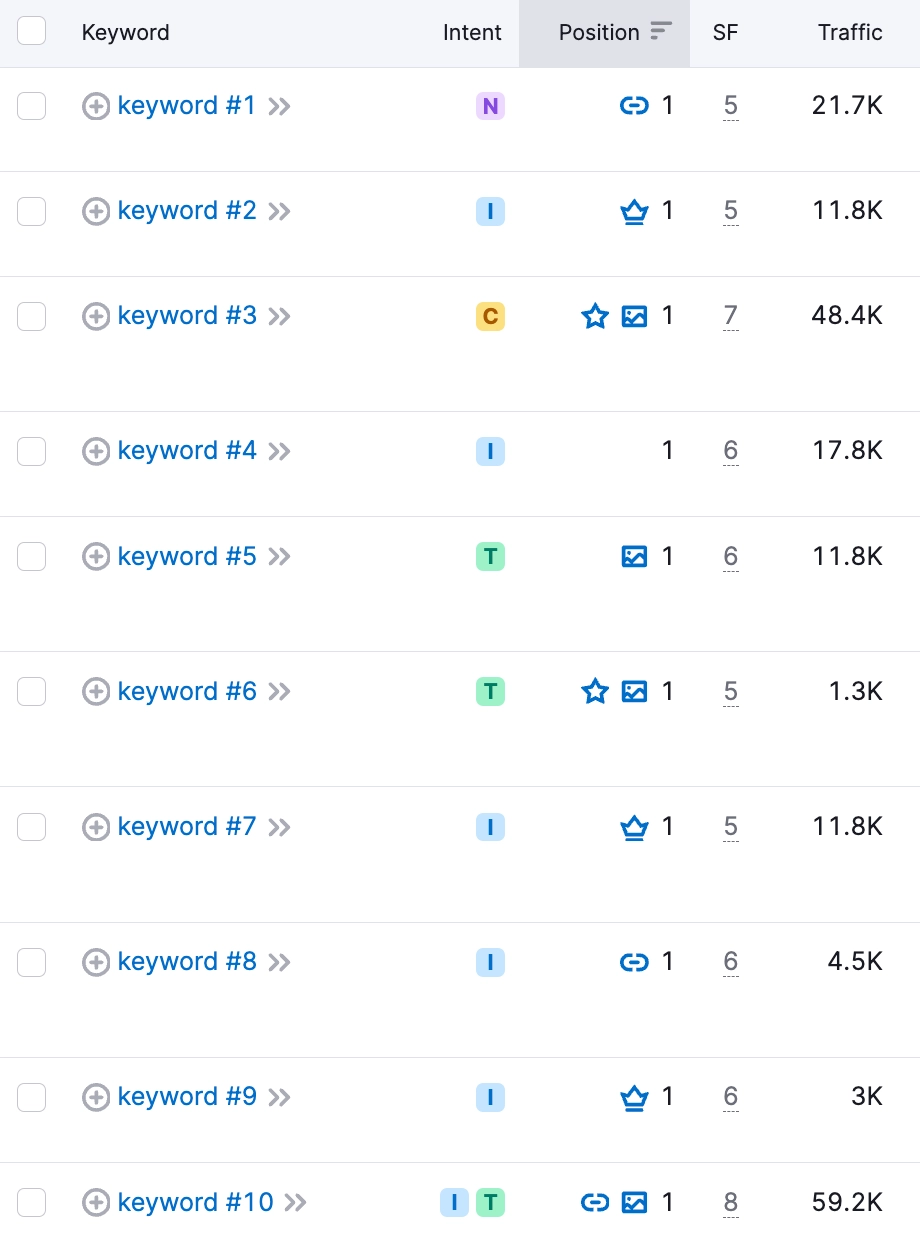Home > SEO Services > Keyword Research

Keyword Research Service
Collecting and clustering keywords for your website allows Google to understand what queries your website should rank for.
What is an SEO Keyword Research Service?
Keyword research is a professional service that helps businesses identify the most relevant and effective keywords to target in their website content. These services analyze search trends, keyword competitiveness, and searcher intent to determine the best keywords that can drive traffic to a website from search engines.
- Competition analysis
- Google Trend analysys
- Keyword Difficulty
- Search volume
- Low hanging fruit keywords
- Keyword mapping and integration
The Benefits of Keyword Research Service
Our team is ready to collect semantic core for you.
- 15-min call
- Understanding business needs
- Clear report
How Our Keyword Research Service is Performed:
Our comprehensive Keyword Research service is designed to boost your website’s visibility and drive targeted traffic.
Initial Consultation
We start with an in-depth discussion to understand your business objectives, target audience, and specific challenges. This helps us tailor our keyword research to align with your goals.
Competitive Analysis
We analyze your main competitors to identify the keywords they are targeting. This helps us understand the competitive landscape and uncover keyword opportunities that you can leverage.
Keyword Research
Using advanced tools and techniques, we generate a list of potential keywords relevant to your industry. We focus on identifying high-traffic, low-competition keywords that can provide quick wins and long-term growth.
Keyword Evaluation
Each keyword is evaluated based on search volume, competition, and relevance to your business. We prioritize keywords likely to drive the most valuable traffic to your site.
Content Gap Analysis
We examine your existing content to identify gaps where new keywords can be incorporated. This ensures that your content strategy is aligned with the keywords that matter most to your audience.
Long-Tail Keyword Identification
We focus on long-tail keywords, specific phrases that potential customers are likely to use. These keywords often have lower competition and higher conversion rates, making them valuable for niche targeting.
Actionable Keyword Strategy
Our team compiles a detailed report with actionable keyword recommendations. This includes suggestions for new content, optimization of existing content, and strategies for improving your search engine rankings.
Implementation Support
We offer guidance and support throughout the implementation process, ensuring that your keyword strategy is effectively integrated into your content marketing efforts.
Our SEO tools:







 Momoe Kamata2024-06-21They are managing my Google profile for 2 months. We’ve set up the goal to be in the top three in one of Chicago suburbs. I feel positive results in calls amount, but there is still a lot of local seo work to be done.
Momoe Kamata2024-06-21They are managing my Google profile for 2 months. We’ve set up the goal to be in the top three in one of Chicago suburbs. I feel positive results in calls amount, but there is still a lot of local seo work to be done. 木村星羅2024-06-21I hired them for website redesign. To be honest they are not great designers, but their experience in SEO optimization is priceless. Website looks clean and pretty simple, but rankings go up, so i don’t know how it works, but this is definitely much better than just a fancy website with 0 visitors =)) 5 out of 5!
木村星羅2024-06-21I hired them for website redesign. To be honest they are not great designers, but their experience in SEO optimization is priceless. Website looks clean and pretty simple, but rankings go up, so i don’t know how it works, but this is definitely much better than just a fancy website with 0 visitors =)) 5 out of 5! Віталій Тареєв2024-06-19Зробили гарний вебсайт! Рекомендую!
Віталій Тареєв2024-06-19Зробили гарний вебсайт! Рекомендую! Suyen Lee2024-06-18This is exactly the kind of realistic approach I needed for the SEO Chicago market. After working with large, impersonal marketing agencies, it's refreshing to have someone like Yulian who's available every day to communicate and brainstorm new ideas for my website. He truly makes you feel like you and your business are a priority, not just another account.
Suyen Lee2024-06-18This is exactly the kind of realistic approach I needed for the SEO Chicago market. After working with large, impersonal marketing agencies, it's refreshing to have someone like Yulian who's available every day to communicate and brainstorm new ideas for my website. He truly makes you feel like you and your business are a priority, not just another account. Clifford Hayes2024-06-14Nice work guys !!!
Clifford Hayes2024-06-14Nice work guys !!! Alyssa C2024-06-14Overall, this team has improved our SEO, but it hasn't been without challenges. Their team is skilled and the strategies are effective, but we experienced some missteps in the implementation process. They were able to rectify most issues, but consistent follow-up is needed to ensure everything runs smoothly. Still, the results have been positive for our business
Alyssa C2024-06-14Overall, this team has improved our SEO, but it hasn't been without challenges. Their team is skilled and the strategies are effective, but we experienced some missteps in the implementation process. They were able to rectify most issues, but consistent follow-up is needed to ensure everything runs smoothly. Still, the results have been positive for our business Ксенія Пономарьова2024-06-13Thanks to Seotwix, our cafe's Google Maps visibility has skyrocketed. Highly recommend their local SEO expertise!
Ксенія Пономарьова2024-06-13Thanks to Seotwix, our cafe's Google Maps visibility has skyrocketed. Highly recommend their local SEO expertise! Matheus Borges2024-06-13Gracias a su optimización de SEO local, ahora aparecemos en los primeros resultados de búsqueda locales, lo que ha aumentado el tráfico de clientes a nuestro negocio
Matheus Borges2024-06-13Gracias a su optimización de SEO local, ahora aparecemos en los primeros resultados de búsqueda locales, lo que ha aumentado el tráfico de clientes a nuestro negocio Jasmine Brown2024-06-13They are very proactive, responsive, and genuinely invested in our success. The increase in organic traffic and lead generation has exceeded our expectations. We couldn’t be happier with the results!!
Jasmine Brown2024-06-13They are very proactive, responsive, and genuinely invested in our success. The increase in organic traffic and lead generation has exceeded our expectations. We couldn’t be happier with the results!!
FAQs about Keyword Research Service?
Looking to learn more about keyword research? Browse our FAQs:
Keywords can be categorized into various types, including:
- Short-tail Keywords: These are broad and general terms usually consisting of one or two words, such as “shoes” or “SEO.”
- Long-tail Keywords: These are more specific phrases typically consisting of three or more words, like “best-running shoes for flat feet.”
- LSI (Latent Semantic Indexing) Keywords: These are related terms that add context to your content, helping search engines understand its relevance.
- Branded Keywords: These include brand names or specific product names, such as “Nike running shoes.”
Important metrics in keyword research include:
- Search Volume: The number of times a keyword is searched for in a given period.
- Keyword Difficulty: A measure of how hard it is to rank for a keyword.
- Cost Per Click (CPC): The average cost advertisers pay for a click on their ad for a specific keyword.
- Click-Through Rate (CTR): The ratio of users who click on a search result compared to those who view it.
Common mistakes include:
- Ignoring Search Intent: Not considering the user’s intent behind a search query.
- Focusing Only on High-Volume Keywords: Overlooking valuable long-tail keywords that might have lower competition.
- Neglecting Local Keywords: Failing to target location-specific keywords if you run a local business.
- Overstuffing Keywords: Using keywords excessively, can lead to penalties from search engines.
Current trends include:
- Voice Search Optimization: Adapting keywords for voice search queries, which are often more conversational.
- Semantic Search: Focusing on the meaning behind search queries rather than just the exact match keywords.
- User Intent: Prioritizing understanding and matching the user’s intent behind searches.
- AI and Machine Learning: Leveraging AI tools to predict and analyze keyword trends and user behavior.
